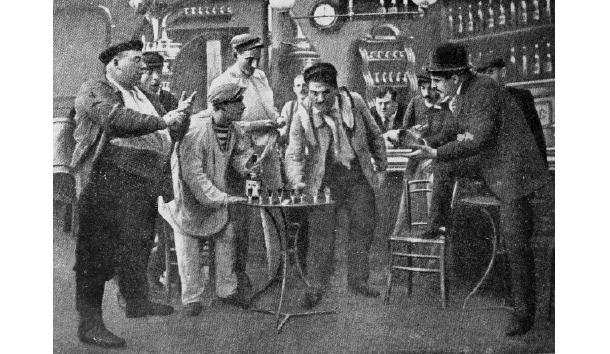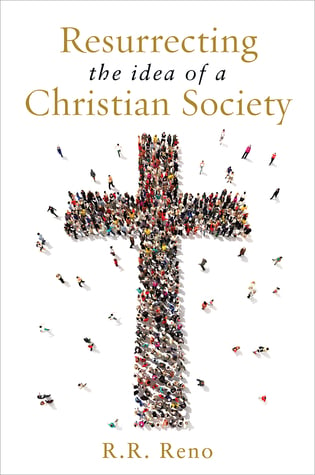“When a culture of freedom becomes a cult of freedom, injustice, suffering,
and social dysfunction get explained
away as ‘choices.’”
—R.R. Reno
The burden of this important book by the editor of First Things is the need to restore genuine freedom to American society—and, by implication, Western society as a whole.
By my reckoning, a false view of freedom as unimpeded choice and self-definition has led to a deregulation of culture more consequential than market deregulation. This deregulation has benefited the strong and hurt the weak.
Indeed, as R.R. Reno understands America in the 21st century, deregulation is class warfare in contemporary form. Ending that warfare, he argues, is “the most important social justice issue of our time. . . . We also need,” he adds, “to recover solidarity, limited government, and a sense of the transcendent”—natural goods he thinks crucial to the project of rehumanizing American society today.
Readers of First Things will recognize themes previously introduced in the author’s contributions to his magazine, and elsewhere. Mr. Reno begins with a highly original consideration of the relative importance of freedom and equality as Americans understand these terms, and he concludes that Americans have always valued the second of them as a means to realizing the first. Freedom for them has always meant freedom from tyrannical government, but also from the people—the majority—and, more recently, from the peoples: from tribal groupings of classes, races, and religions. “We want a culture of the people, by the people, and for the people, not defined by white European traditions, male preferences, or any other form of group identity.” This ambition has naturally proved very difficult to realize. It has also caused progressives to ask why our bodies should be allowed to limit our “most intimate choices,” if no one else can. “If the American dream is true, if my destiny is truly mine to make, nature herself must be shouldered aside.”
Redistribution in America, Reno thinks, has never been valued primarily for itself—even today, when economic inequality is a subject of great concern—but for the cultural and political influence, and therefore the freedom, conferred on individuals by every form of equality. Freedom, then, is the good most prized by Americans. But freedom to what purpose? Today, it looks very much as if freedom, for progressives, is freedom for the sake of freedom. “The American dream thus turns into a totalitarian nightmare of political power marshaled to subdue everything—except freedom,” and to impose equality (whose aim in turn is to protect freedom, the national dream) on the American public.
Unlike many conservatives for whom multiculturalism is Marxism in updated form, Reno understands it as “an egalitarian cultural therapy” that insists upon equal time for everybody (except white males and Christians, who have already had their time, and far too much of it), simultaneously. “Far from an anti-American perversion, multiculturalism serves the American dream—everyone must have the greatest possible freedom to make his own future,” while also making his voice heard. Multiculturalism, though it “empowers” minorities, includes the white elite among its beneficiaries by giving it expanded opportunities for “choice,” and thus for still more freedom. At the beginning of the liberal era, liberals asked why the accident of birth should determine one’s social position, or indeed anything at all.
Now we find our universities full of people who question why the happenstance of being born in the West should dictate their moral convictions. If my destiny is not determined by my social class or race or religion or even my body . . . why should it be determined by my culture?
From that question, a second follows naturally:
If we prize the dream of freedom above all else, the most American thing to do is to renounce the authority of Western culture!
Anti-Americanism is thus a kind of hyper-Americanism. . . . A repudiation of America strikes a blow for still greater freedom. If we take America down a notch or two, we disenchant the inherited social norms that control us, giving ourselves psychological space to live according to whatever values we prefer.
Reno sees moral relativism, which is closely related to multiculturalism, as “a cognitive therapy that enhances freedom.” Yet it is other things as well. Relativism is viciously anti-Christian. It operates as a social and moral poison on every subelite social group, while establishing the educated upper-middle class even more securely in a gratifying world of its own invention. And it is consistent with, and conducive to, the powerful and, finally, tyrannical government that is its natural result.
Reno argues that only a society restored to wholeness by Christian understanding, Christian wisdom, and, above all, Christian love can reform postindustrial society by defending the weak, raising up the poor, promoting solidarity, limiting government, and “seeking higher things.”. Those parts of his book describing life as Americans belonging to the lower-middle and lower classes live it today recall Zola’s brutal novel L’Assommoir, no matter that postindustrial America and industrial Paris in the late 19th-century are otherwise hardly comparable in time and in place. Drawing heavily on Charles Murray’s Coming Apart, Reno shows how what one might call the theorization of life and of morals simultaneously confuses, tempts, and ultimately demoralizes uneducated and nonintellectual people, who ape the manners and particularly the mores of their wealthy, college-educated betters, who, though they spend their lives talking and writing like amoral undisciplined libertines, live according to the highly controlled and disciplined codes of behavior that establish and maintain their worldly success. “We can’t,” Reno insists, “have a society that serves the weak if we don’t end our war on the very possibility of clear rules. . . . A Christian society judges nonjudgmentalism unjust.” Nonjudgmentalism on the part of the elite, by demoralizing the poor, critically aggravates “[t]he greatest social injustice of our time . . . the growing moral inequality of the rich and the poor.” Class warfare today, he thinks, is not economic but moral; the moral exploitation of the poor disguised as their liberation. The best first step toward ending it, Reno suggests, would be to develop policies that penalize divorce.
We live in a society that is dissolving rather than proceeding toward collectivism, and the American crisis today is a crisis of solidarity, not (yet) of freedom. And since atomized societies, as Hannah Arendt argued decades ago, develop naturally into totalitarian ones, the most efficient way to limit oversized and overweening government is to recreate the traditional culture Christianity shaped as a counterbalance to the overactive, overpowerful state, to reestablish the nearly forgotten Christian principle of subsidiarity and intermediary institutions, and to renew the institutions of marriage and the family that precede the state by millennia. While solidarity is crucial to every free society, one is led to question here how any society as geographically vast, socially complicated, wildly pluralistic, and multicultural as the United States in the 21st century could ever achieve solidarity. A further question is how a Christian society could exist without a Christian majority worthy of the description. Reno addresses these reservations with adequate plausibility in his final chapter (“The Possibility of a Christian Society”), where he assesses what he calls “the power of the [Christian] periphery.” “[T]here are plenty of Christians in America, more than enough,” he declares, “to renew the Christian character of our society,” given the spiritual thinness and human insufficiency of the secular establishment’s antimetaphysics. (His argument is reinforced, for Christians, by Christian faith in the graciousness and saving power of God.) While Reno does not expect the “reprise of Christendom,” because today’s Christian counterculture is not, in his view, truly “counter,” and because post-Protestant culture, the culture of the “new WASPs” (the multiethnic, non-Protestant elite that has replaced the old WASP elite by appropriating its institutions and its role and adopting its manners, its thinking, and its social position, and acquiring its poise and confidence), is failing by promising freedom but delivering tyranny—he has confidence in Christianity’s staying power, its ability to exercise a leading influence in the foreseeable future.
The penultimate chapter, “Seeking Higher Things,” is perhaps the book’s finest. Modern liberalism, Reno thinks, reflects Epicurus’ and Lucretius’ philosophy, the belief that the less consideration individuals and societies give “the higher things,” the more pleasant, harmonious, and peaceful their lives will be. Materialism, moreover, has a spiritual appeal, which helps account for liberalism’s reductivism and its deconstructive project. “There are no higher truths to serve. Accept things as they are, for they can’t be otherwise. Far from revolutionary, materialism, like all the lowering therapies, eases the way for empire and for servitude.” Yet human beings are so constituted that they cannot always be content with a philosophy so insubstantial in its false substantiality. Although “the deepest mental poverty of our time is one of imagination and courage, not intelligence and reason,” people have not forgotten how to imagine, humans being as much imagining creatures as they are reasoning ones, and loving ones, and so they will imagine again, despite—or because of—a culture which tries to withhold from them objects of love while offering nothing on which to stand, or take a stand. And those who imagine powerfully will eventually come to faith, and finding faith they will become strong again. “The ability to stand firm against worldly powers is the foundation of freedom. If we cannot be moved, we cannot be controlled. If we can resist domination, we are indomitable.”
Three critical observations did occur to me while making notes for this review on the end pages of the book. The first is that Reno overlooks the fact that innate weaknesses of character for which society bears no responsibility have historically consigned substantial numbers of people to poverty, whether of the spiritual, moral, or material sort, in the past, and doubtless still do—and will continue to do. (Many artists, novelists especially, have insisted upon this insuperable fact, including the author of L’Assommoir.) The second is the observable truth that, owing to character, a sizable proportion of the lower classes seems unable to live responsibly in conditions of mass affluence. The last is that by ignoring the moral responsibility the lower-middle and lower classes of Murray’s Fishtown have to resist the lures, the temptations, the misrepresentations, and the outright lies of the affluent citizens of Belmont, Reno unintentionally condescends to them by discounting the freedom of will and of action with which, as human beings, they are endowed. No Harvard ethicist or Hollywood producer compels any bartender, janitor, truck driver, or handyman to cheat on his wife or divorce her, allow his adolescent children to indulge in drugs at home, or get his girlfriend pregnant out of wedlock. It is true, as Reno insists, that these people are vulnerable today. But everyone is vulnerable to one thing or another and in one way or another, including the residents of Belmont. But to understand is not always—hardly ever, in fact—to excuse. And this goes in the case of the “vulnerable” as much as it does in the case of the “privileged.”
But these are peripheral criticisms. Resurrecting the Idea of a Christian Society is an insightful, optimistic, and encouraging book in a dark time (though one does note the limitation implied by the word idea). And it is a compelling one as well.

[Resurrecting the Idea of a Christian Society, by R.R. Reno (Washington, D.C.: Regnery Faith) 215 pp., $27.99]

Leave a Reply